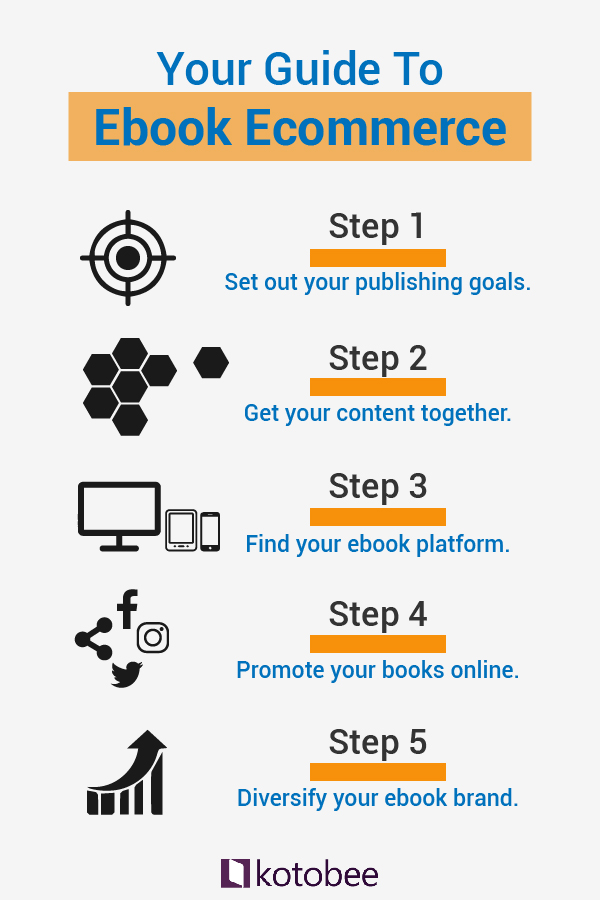Your Guide To Ebook Ecommerce
Your expertise is a viable product you can sell in ebook form. The popularity of ebook readers and smartphone apps like iBooks have made the process of starting your publishing empire easy.

If you can add a selection of titles, each drawing in regular downloads, you can start to create a passive income. Alternatively, if you are a business, you can use your ebooks to attract worldwide sales and interest to your brand.
Of course initially, you may need to invest significant time in creating your title, maybe a smidge of starting capital (although this can be the price of a monthly subscription fee).
Read on to find out more in our guide to ebook ecommerce.

Step One: Set out your publishing goals

If you are a business looking to provide your fans with background information relating to your products, an ebook could be a great way to get the message out there. Alternatively, you may be a hobbyist looking for ways to turn your expertise into a sustainable income.
Regardless of your motives for turning a profit out of digital publishing, you will need a clear goal in mind before you start.
Think about your subject matter. You will need to ensure that the title and description will appeal to readers before you get into the nitty-gritty of writing the ebook. For this, you need to do some smart thinking and research. Look at bestsellers in your topic area, download and read some of these titles and look for ways you can do better than the competition with your book.
Next, conduct some keyword research using Google Trends or a site like SEMRush. Find the key phrases and vernacular used most frequently by your target audience. Then take a broader look at your ebook genre and take note of things like tags, descriptions, cover art and titles.
Once you have read around your preferred genre and subject matter, put together a suitable ebook outline for your title. As a starting point, you could create a book that contains 20-30 pages. You will need an introduction and a conclusion, and the rest of the content should divide into six or seven chapters, as a rough guide.
Don’t be too concerned with making your ebook the most comprehensive title in the history of digital publishing; you can always spread the topic out over a series of titles. In fact, doing this could double or triple your potential for making money from ebook selling.
Step Two: Get your content together

Regarding the writing of the copy, you may be able to complete the full text within the space of a week or so (depending on how much time and discipline you have for writing). You could also choose to outsource this task to a freelance ghostwriter. These can be sourced online from a site like Fiverr or freelancer.com.
Make sure that you have the outline clear in your mind before you start/outsource. Also, ensure that you include all of the relevant keywords and points you need to get your book noticed. Once this process is complete, look at hiring a professional editor or proofreader to give the content a final look-over.
Cover art is another crucial aspect of the digital publishing process; you need to give your books the best chance of catching someone’s eye. Make sure you use a professional illustrator for this. You can also outsource this task to a designer on Fiverr or Upwork, etc.
Step Three: Find your ebook platform

You may wish to spread your books far and wide online, in which case, you could look at Amazon Kindle direct publishing, as well as creating your own website to sell through. Alternatively, you might want to check out Kobo, Lulu, or any of the other top ebook selling platforms.
If you decide to sell through a marketplace, take your time to learn the book genres and tagging criteria, as this will help you optimize your listings. You want to make sure your title gets found by as many potential readers as possible, so don’t skip this step.
Creating a website will help you promote as well as sell your books online. Through WordPress’ ecommerce platform, you can get up and running quickly if you already run an existing blog. Kotobee even has a WooCommerce plugin that allows you to integrate your cloud ebooks and libraries for selling through your WooCommerce store under your WordPress site.
Alternatively, Shopify is a great plug-and-play ecommerce hosting option for those with no experience in making websites. You can reach dedicated help and support pages, as well as a range of apps and plugins that make it easy to promote your ebooks on social media.
Step Four: Promoting your books online

This is arguably the most ‘hands on’ stage of ebook selling, you need to find your potential audience and ensure that your ads inspire them to click through and buy.
Set up accounts on Facebook, Instagram, Pinterest, LinkedIn, Twitter, etc. and use social media analysis tools to build up a profile of your ideal customer. Look at the sites your audience reads and shares the most. Also look at the times of day/week they engage most frequently with authors online.
You will also want to look for social media influencers and thought leaders within your industry. If you feel like your title might appeal, get in touch with these leading figures. See if you can strike up a conversation and then plug your latest ebook to draw reviews and clicks from fans.
Paid for advertising with any of these social media site options will also be a worthwhile investment. Create unique social media graphics using a site like Canva to make your ads look great. Work out a suitable daily advertising budget and make sure you get specific with your audience targeting. Ensure that your money is only being spent targeting people who might be interested.
In all social media marketing tasks, aim to provide your readers with some useful information for free. You could also offer additional blog posts or vlogs on YouTube to get people talking about you.
Don’t forget: Bring in some free advertising for your ebook business by plugging your wares in everything you do online.
Step Five: Diversify your ebook brand

If you are doing well with your marketing, building up an audience with relevant and engaging content, you may have the demand to diversify your ebook offerings.
Why not try:
- Creating a series of online tutorials with video tutorials and resources. Skillshare is a great site for hosting learning programs that attract paid subscribers;
- Developing a line of merchandise, such as printed t-shirts and hats, etc;
- See if you can turn your help and advice ebook into a mobile app. You can find mobile developers who can make you a suitable prototype app quickly and easily. You can choose to create a paid-for app or a freeware app that hosts advertisements;
- You could also choose to dedicate more time to building up a vast online audience, by making regular videos through YouTube and then running Google AdSense to bring in an income from the views.
You could start a self-publishing empire without writing a single word. Dedicate the bulk of your time and effort into marketing your ebooks to the right audience and you could start generating a profit from ebook publishing today.
Read more.
Sell Books on WordPress with the WooCommerce Plugin
The Basic Guide to Self-Publishing Books
Guide to Selling on Amazon, Barnes & Noble, and Kobo
What promotion tools or strategies have worked best for you in the past?

Victoria Greene is a freelance writer and branding consultant blogging over at Victoriaecommerce. Here she advises those looking to turn their skills and talents into a viable ecommerce business.














